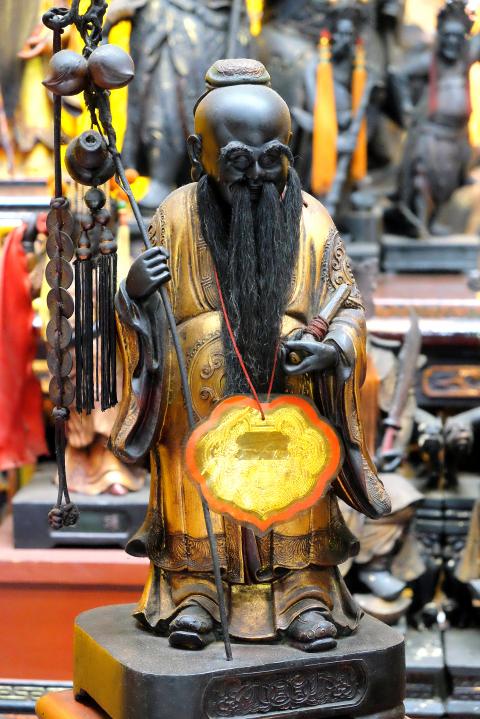Legislator Wu Yi-chen (吳宜臻) urges couples to be vigilant on Valentine’s Day.
“Don’t be impulsive, don’t relent to coaxing, don’t be swept away by passion, don’t upload [private photos of each other],” Wu said at a Wednesday press conference at the Legislative Yuan.
Wu is about to push an amendment to the Sexual Harassment Prevention Act (性騷擾防治法) in response to a recent rash of privacy infringements between ex-couples.

Photo: AFP
From 2012 to 2013, major private photo scandals increased from 24 to 42. The majority of these photos were taken in the context of a romantic relationship and later used for retribution, according to the Taipei Women’s Rescue Foundation (婦女救援基金會).
Neele Wang (王建中), a long-time hotline counselor in Taipei, said that acrimonious fighting, bitter breakups and frightening divorce rates are societal trends that have become a major focus of his work.
Wang’s Focus and Forecast Consulting Company is a provider of employee assistance programs — services meant to boost employee productivity in the workplace. One service is hotline counseling to employees across Taiwan who have personal, legal, financial and health questions. A lot of the questions he deals with are personal.
“We have many different services, but get a lot of phone calls about relationships. It’s one of the top three reasons employees call,” Wang said.
“It’s not just men who behave in frightening ways — women do it, too. Shouting, throwing things, slamming doors, or something worse when they become angry. It’s not uncommon,” Wang said.
In Taiwan, new pressures on modern love include changing gender expectations, record-long working hours and social technologies that can reduce real-life human contact, Wang said. But the basic romantic relationship problems, such as conflicts with in-laws, are the same.
“For the most part, many of the problems that plague relationships are versions of problems that existed before,” he said. “You can solve them with good communication.”
“A very damaging thing we see a lot is one person saying yes, when he thinks no,” Wang said.
“He says ‘okay,’ but is secretly furious and thinks, ‘Why would you do this?’ He finds his mates and complains, but he does not complain to [his girlfriend]. He does not want her to become angry or set her off in any way. They don’t resolve their issues. They build up and then come out at one time, and sometimes it is a destructive expression of anger.”
HAPPINESS WORKSHOP
In the weeks leading up to Valentine’s Day, Johnny Chen (陳俊良) of Focus and Forecast has been busy planning the Happiness Workshop (幸福工作坊), a series of Thursday night classes taught by invited professionals.
The course begins on Feb. 27 and features classes on maintaining a peaceful and productive relationship. There’s “getting to know yourself,” “understanding the influence your nuclear family has on your relationships” and a psychometric assessment based on the Myers-Briggs Type Indicator that’s used to help one partner understand the other’s communication style. There is a unit on positive ways to handle a breakup.
So far, couples have not rushed to enroll. But Chen, a 20-something in his first corporate job, stands behind the merits of his brainchild.
“It addresses a real problem. Maybe it’s a problem people don’t want to talk about,” he said. “Finding a romantic spark isn’t too hard, you could do that by chance walking down a street. What’s hard is maintaining a relationship and not letting it sour.”
For more information about the Happiness Workshop contact Johnny Chen at (02) 3765-3313 ext. 23, or go to (Chinese): www.goo.gl/XGoEUg.

In the March 9 edition of the Taipei Times a piece by Ninon Godefroy ran with the headine “The quiet, gentle rhythm of Taiwan.” It started with the line “Taiwan is a small, humble place. There is no Eiffel Tower, no pyramids — no singular attraction that draws the world’s attention.” I laughed out loud at that. This was out of no disrespect for the author or the piece, which made some interesting analogies and good points about how both Din Tai Fung’s and Taiwan Semiconductor Manufacturing Co’s (TSMC, 台積電) meticulous attention to detail and quality are not quite up to

April 21 to April 27 Hsieh Er’s (謝娥) political fortunes were rising fast after she got out of jail and joined the Chinese Nationalist Party (KMT) in December 1945. Not only did she hold key positions in various committees, she was elected the only woman on the Taipei City Council and headed to Nanjing in 1946 as the sole Taiwanese female representative to the National Constituent Assembly. With the support of first lady Soong May-ling (宋美齡), she started the Taipei Women’s Association and Taiwan Provincial Women’s Association, where she

Chinese Nationalist Party (KMT) Chairman Eric Chu (朱立倫) hatched a bold plan to charge forward and seize the initiative when he held a protest in front of the Taipei City Prosecutors’ Office. Though risky, because illegal, its success would help tackle at least six problems facing both himself and the KMT. What he did not see coming was Taipei Mayor Chiang Wan-an (將萬安) tripping him up out of the gate. In spite of Chu being the most consequential and successful KMT chairman since the early 2010s — arguably saving the party from financial ruin and restoring its electoral viability —

It is one of the more remarkable facts of Taiwan history that it was never occupied or claimed by any of the numerous kingdoms of southern China — Han or otherwise — that lay just across the water from it. None of their brilliant ministers ever discovered that Taiwan was a “core interest” of the state whose annexation was “inevitable.” As Paul Kua notes in an excellent monograph laying out how the Portuguese gave Taiwan the name “Formosa,” the first Europeans to express an interest in occupying Taiwan were the Spanish. Tonio Andrade in his seminal work, How Taiwan Became Chinese,